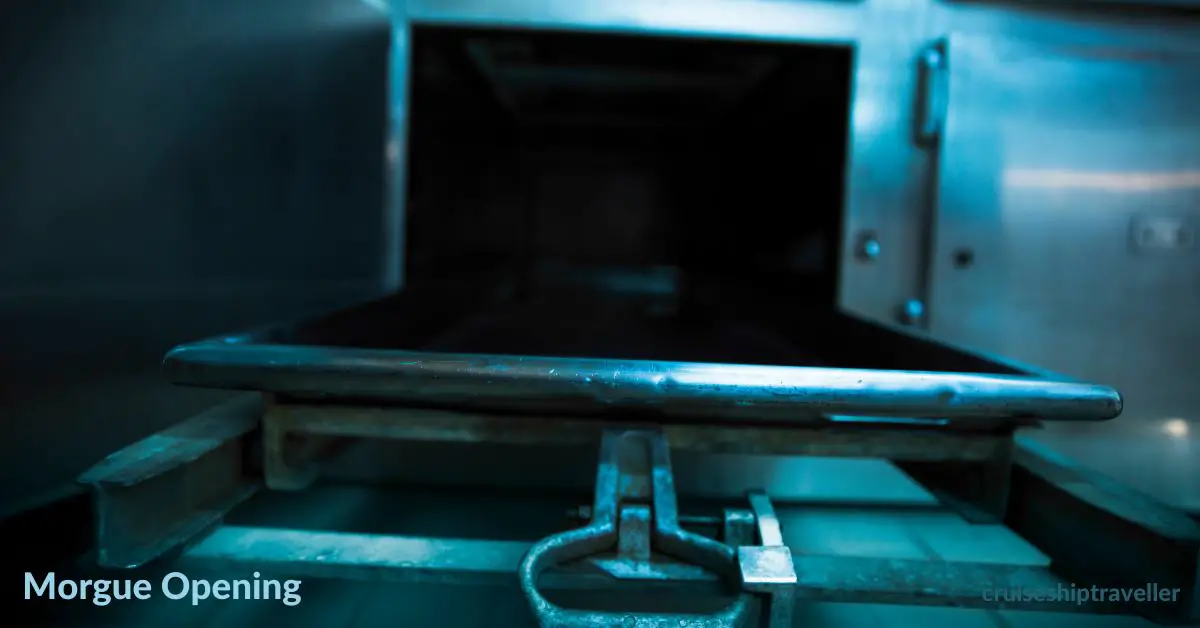While it may not be something you think about when planning your vacation, it’s essential to know what to do in the event of a death while on a cruise ship and whether there is a cruise ship morgue on board.
This post goes over the process of dealing with a death on a cruise ship and what happens to the body after the cruise.

Is There a Morgue on Cruise Ship?
Yes, cruise ships have morgues onboard.
By law, cruise ships must have body bags and a morgue on board in case of death on the journey.
Typically a cruise ship morgue has enough space for three bodies.
Larger vessels may have space for up to 6 bodies, maybe more in some in cases, but to need the use of them all would be a rare occurrence.
When you think some of the largest cruise ships have a capacity of 4000 to 6000 passengers, many of them in their older years, it’s no surprise there are deaths.
While it may not be a thought for many passengers, for others, it can be a source of great comfort to know that the ship is prepared for any eventuality.
Many passengers on a cruise are in their older years and perhaps in ill health but still trying to enjoy their life to the fullest.
As many of these passengers are in retirement, some choose to go on cruises for months.
Knowing there is a place for those who pass away on the ship can give peace of mind to these passengers and their traveling companions.

What if the Cruise Ship Morgue is Full?
In rare instances on small vessels with fewer morgue spaces, there have been reports of bodies stored in the ship’s large freezers or refrigerators, depending on the available cooling options.
Either way, it’s a priority that the body is kept cool before it starts decomposing and becoming a potential health hazard.
It is less than ideal and undoubtedly unsettling for staff who work in the vicinity.
A morgue is a room or building where dead people’s bodies are kept before burial or cremation.
In most cases, a morgue’s located in a hospital, but on a cruise ship, the morgue is typically located at the bottom of the ship, on the lower decks, and away from passengers.
On a ship, the morgue will be relatively small and just large enough to serve the purpose of holding up to 3 to 6 bodies in cool refrigerated compartments made fro stainless steel.
The morgue is temperature-controlled and has refrigeration units to preserve the bodies of the deceased until they can transport back to shore.
The morgue on a cruise ship is staffed by the ship’s doctor and a nurse medical team.
Where is a Cruise Ship Morgue?
The morgue on a cruise ship is typically located on the lower decks, away from the high-traffic passenger areas.
The location of the morgue is not usually shown on the ship’s deck plans.
This short video features an onboard morgue on the Carnival Fantasy cruise ship (one of the smallest Carnival cruise ships at the time of service).
As you’ll see, the morgue is quite discreetly hidden away. The person filming opens the morgue door, and you can see the opening showing three layers to hold three bodies potentially.
What Happens When Someone Dies on a Cruise Ship?
When someone dies on a cruise ship, the ship’s doctor will pronounce the person dead and then notify the cruise captain of the death.
The captain will then pass orders for the next of kin to be contacted and arrangements for the body to be transported back to shore.
If the death occurs in a port or excursion, the body will be taken to a local morgue and not back onto the ship.
If the death occurs on the ship, the body will be kept in the ship’s morgue until the ship reaches the next port and disembarks if the country will allow it and arrangements for the repatriation of the deceased.
In part, it depends on where the cruise ship is traveling; larger port cities are more likely to accept a body and deal with the issue, while a small island location may not.
Alternatively, the ship will keep the body on board until the cruise ship returns to its home country.
An accompanying passenger to the deceased will also tend to disembark with the body.
A death certificate will need to be issued, and the cause of death may dictate what will happen next.
If the death was due to natural causes, the ship would usually not be required to investigate.
The U.S Centers for Disease Control and Prevention (CDC) will also need to be informed when the cruise ship is at a US homeport.
However, if the death was due to foul play or an accident, an investigation will be required, and submit a report submitted to the proper authorities.
Sometimes, the ship may be required to question passengers as witnesses.

Reporting the Death
The death of a passenger will need reporting to the relevant local authorities.
If the port is in the US, this will be to the US coastguard.
What is the Code for Death on a Cruise Ship?
Cruise lines have many codes for the staff to communicate without alarming passengers.
In the case of a death on board, the cruise ship secret code is “operation rising star” which discreetly alerts crew members that a passenger has passed away.
Travel Insurance
Any death-related costs incurred should be covered by travel insurance but make sure any cover includes repatriation.
Returning the body home can become quite expensive. Sometimes, the cost may need to be paid upfront and claimed back later.
Without insurance, the costs may have to be covered by the passenger’s family.
How Do People Die on Cruise Ships?
Elderly passengers make up a large portion of the cruise ship demographic.
As people age, their health deteriorates, and they become more susceptible to illness; therefore, it’s no surprise most deaths on cruise ships are from natural causes, such as heart attacks or strokes, or possibly an underlying health condition.
Cheaper than a Care Home or Hospice
I’ve heard it reported many times that some older folk spend their last days cruising rather than go to a care home because it works out cheaper.
Causes of Death on a Cruise ships
- Natural Causes
- Heart Attacks
- Strokes
- Old age related Illnesses
- Accidents
- Suicide
- Murder
While most deaths onboard cruise ships are from natural causes, there are occasional accidents, suicides, and murders. These are, however, all rare occurrences.
It’s rare for people to die from accidents, jumping overboard, or crime on cruise ships.
If you are partcularly interested in the morid side of cruising, there’s a website dedicated to cruise deaths called https://www.cruiseshipdeaths.com/
It’s certainly not uncommon for deaths to occur on a cruise ship, as this Reddit thread testifies with many people sharing their experiences.

Support Staff
No matter what the arrangements are, the cruise ship staff will do everything they can to make sure that the process is as smooth as possible for the family during what is undoubtedly a difficult time.
Certain employees from the cruise line care team will have received training in providing emotional and active support in sorting out the next steps for grieving passengers of the deceased.
If you have any questions about what to do in the event of a death on board a cruise ship, be sure to ask your travel agent or the cruise line before booking your trip.
It could be worth finding out how they assist in the event of needing repatriation, as this can be quite an involved process and overwhelming at this emotional time.
It’s important to be prepared for all eventualities when planning your vacation, and knowing what to do in the event of a death is one of them.
Volunteer Clergy
Some cruise lines have volunteer clergy onboard who may assist in supporting the family of and friends of the deceased.
There may also be a small chapel on board which may a place of comfort for those grieving.
Frequently Asked Questions
Why Do Cruise Ships Have Morgues?
Cruise ships have morgues to be able to safely store the bodies of any persons who pass away while onboard. The stainless steel refrigerated morgue allows for the proper storage and management of the deceased until they can be returned to their families or transported to a port where local authorities can take over.
Do All Cruise Ships Have a Morgue?
All oceangoing cruise ships are required to have a morgue onboard along with body bags in which to store the body. Smaller River cruise ships do not need an onboard morgue. Being so close to land they are not required, although provisions would be in place to deal with a body in the event of a death.
What Happens to The Body When Someone Dies on a Cruise Ship?
If someone dies on a cruise ship the body is placed in a body bag and stored in an onboard morgue that’s usually discreetly located on the lower decks. Arrangements will then need to be made to get the body home, either by return journey or disembarking the body at a port of call.
How Many People Die on Cruise Ships?
It’s typically estimated that 200 people a year die on cruise ships every year. However, the real figure is likely to be higher, especially if including deaths that occur at ports of call.
Conclusion
It’s not surprising that many people die on cruise ships every year, as the elderly demographic make up a large percentage of passengers.
Most deaths are from natural causes, but the staff on board are trained to deal with all eventualities and will do everything they can to support the deceased’s family.
If you have questions or have experienced the event of a death on a ship yourself, please share in the comments.


